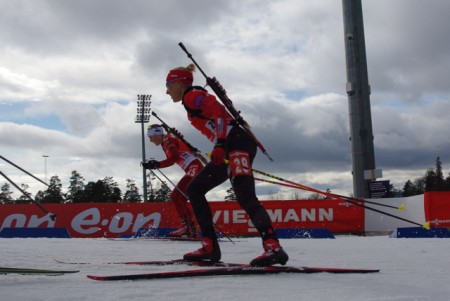
OSLO, Norway– Rosanna Crawford wasn’t even sure she was going to start today’s 12.5 k mass start, the final competition of the World Cup biathlon season.
Yesterday, she was knocked down by a Russian coach during the pursuit competition, and at the time she said she re-injured a sprained thumb. With a little more time to assess the injuries, she realized that she had now hurt the other thumb, and re-aggrvated a back injury as well.
“She is bothered a little bit with that crash from yesterday,” Canadian head coach Matthias Ahrens said while watching Crawford battle out the final loop of the mass start, which she eventually decided to compete in. “The physio was working on her, but she feels it. Hopefully now the adrenaline keeps it out.”
That seemed to be the case, as Crawford had a penalty in the first prone stage but then cleaned all the rest of her targets and skied to the best result of her career: ninth place. She had been waiting for a top ten all season, and come close in the sprint here on Thursday when she placed 11th.
“To finally achieve the goal of top ten, and 19 for 20, I’m very happy,” Crawford said. “It’s a good way to end the season, especially when I was debating not starting this morning.”
As it turned out, the injuries didn’t hamper her too much.

“Normal,” she said with reference to her skiing. “I think that it almost kind of helped. It took off so much pressure. I thought, okay, whatever, you just have to go out there and survive and make it to the finish line. So that kind of helped things along.”
While he was clearly nervous about whether Crawford would be able to ski at her usual level, Ahrens was also distinctly unworried, because he knew she had the mental aspect down.
“She definitely was worried,” Ahrens said. “But she has a good attitude. She can put the hammer down and go.”
Crawford said that the miss in the first prone stage did not concern her, and the information she got next actually made her more confident.
“They showed me my group on the board, and it was perfectly centered, I just yanked the last shot,” she said. “So I knew to just keep it smooth to the next ones. And then to just take it slow in standing. I find when there’s other girls around me, I kind of get caught up with hearing all the shots and thinking that I need to fire my shots off, so I really took it nice and slow and smooth.”
Teammate Zina Kocher was the one grabbing attention in the beginning of the race. After cleaning both prone stages, she was skiing in second place, chasing Laura Dahlmeier of Germany and getting lots of TV time.
“That was really solid,” she said of her prone shooting. “My strategy was to just stay in control and stay calm, and it worked for half of the race.”
Once she hit standing, things began to deteriorate as she missed three shots in each stage.
“Then I just, I don’t even know what happened,” she said. “I think I got excited. And then I took too long. Then I started shaking. I just got really nervous.”
Kocher dropped to 29th place out of 30 racers after the final stage, but climbed back up to 21st by the finish. Despite the disaster in standing, she was able to take positives away from the race and hopes to put herself in the same position next year.
“It was really exciting,” she said. “I hope that I can repeat that next year and successfully mentally stay there.”
Plus, having two Canadian women in a mass start race is a first. Both Kocher and Crawford have competed in mass starts before, but they have never been racing well enough at the same time to qualify together.
“It’s really exciting and it shows such a lot of development in our team,” Kocher said of Crawford’s result. “Two of us in the mass start to begin with, that’s a huge improvement in the entire program in many many years.”
“Rosanna and Zina have had great seasons,” Biathlon Canada High Performance Director Chris Lindsay wrote in an e-mail. “The goal was to be fast for the Olympics and they were able to achieve this goal. The confidence achieved in Sochi, despite a few disappointments, has clearly carried through to the final World Cup races. Obviously the physical preparation has worked – but we are also seeing a level of maturity and mental toughness that has allowed them to legitimately fight among the best biathletes in the world. Nothing about today’s performance, last week’s performance, or this season’s performance is a surprise.”
Like Kocher, American biathlete Susan Dunklee also had six penalties. She placed 18th.
“In the mass start, I struggled with the shooting and had one particularly poor standing stage,” she said in a United States Biathlon Association press release. “But I finished with a clean stage and strong fight on the last loop. I had a good run of things at the end of the season and will be headed into the summer with a lot of good motivation.”
Chelsea Little
Chelsea Little is FasterSkier's Editor-At-Large. A former racer at Ford Sayre, Dartmouth College and the Craftsbury Green Racing Project, she is a PhD candidate in aquatic ecology in the @Altermatt_lab at Eawag, the Swiss Federal Institute of Aquatic Science and Technology in Zurich, Switzerland. You can follow her on twitter @ChelskiLittle.



